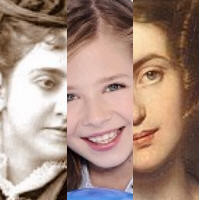Don’t Shun the Teenage Soprano
|
Ellen MacDonald-Kramer [July 2013.]
Modern opera enthusiasts may sneer at the likes of Jackie Evancho, that irritatingly angelic ‘popera’ sensation. Those of us with fond memories of the Nineties will also recall Charlotte Church. But it isn’t only their crossover repertoire that makes us cringe; it’s the extreme youth associated with both singers. Vocal tastes, in the operatic world, tend towards the mature. We often hear, and we already know, that legitimate opera singers are adults with fully developed, powerful, meaty voices – voices enhanced by several years of training, and capable, if needed, of singing over large orchestras and filling the grandest of the world’s opera houses. And in spite of the varying demands of the repertoire – from the agility required by Handel to the sheer brute power necessitated by Wagner – this requirement remains the same. While we appreciate that there are about a million different kinds of sopranos, they all have that one thing in common: they aren’t teenagers. Few opera singers reach the height of their careers in their thirties, still fewer in their twenties. For most opera singers, the twenties are a time of continuous training and development. But as we know so well, this development must come naturally; it must never be forced. We’re used to considering the young voice as a delicate thing. This is why Jackie and Charlotte make us wince when they sing ‘O mio babbino caro’, because, however beautiful, their light, pretty little voices are not – to our ears, anyway – mature operatic voices. It may come as a surprise, then, that this wasn’t the case 200 years ago. Take, for example, the German soprano Henriette Sontag, born in 1806. Sontag was just fifteen when she was asked to step into a major role, the company’s usual prima donna being indisposed. Her youth did not prevent her from becoming an immediate success, and other engagements followed. At seventeen she created the title role in Weber’s Euryanthe, and at twenty she sang Rosina in Il barbiere di Siviglia. Beethoven himself admired Sontag and – aged just eighteen – she was the first soprano soloist in both his Ninth Symphony and Missa solemnis. Given the arduous demands associated with Beethoven’s vocal music, we might tense at the thought of its delivery by a soprano barely past childhood. Sontag looked the child’s part too: she was of unusually petite stature, and at some point during her career, took to wearing shoes with four-inch soles to enhance her height. There is no record of Sontag suffering any vocal problems because of her early debut. Could the long interval in her career, when she gave up opera for the sake of her marriage to a Sardinian diplomat, have saved her voice from inevitable damage? When she returned to the stage after nineteen years, now a mature singer, she effortlessly resumed her earlier success. Another such prodigy was Adelina Patti, whose career was possibly the greatest of the nineteenth century. Born in 1843, Patti debuted in the title role of Lucia di Lammermoor when she was a mere sixteen years old, and before she was twenty had already excelled in many of the great bel canto roles. Her career lasted several decades, and she can be heard (albeit past her prime) on several gramophone recordings. Perhaps it was Patti’s obsessive care for her voice that was responsible for the longevity of her career after such a premature start. Patti was so fearful of vocal damage that she adhered to a strict diet and schedule. Her lunch consisted of eggs and white meat, she napped in the afternoon, and she never drank caffeine or alcohol. The merest hint of vocal strain could prompt her to cancel a performance at a moment’s notice, and she was not beyond sending servants to rehearsals on her behalf. The extreme youth in which Sontag and Patti started their careers was not unheard of in either the eighteenth or the nineteenth centuries. The Mozartian soprano Angelica Catalani was seventeen when she first sang in Venice. Maria Malibran and Pauline Viardot, daughters of the tenor Manuel Garcia, were seventeen when they made their respective debuts. While there was no recording technology to document the teenage voices of any of these singers, we can be sure of one thing: their youthful voices were not unusual to audiences of the time. Author Henry Pleasants said it well: ‘Ears that had never heard the kind of dramatic soprano developed to meet the requirements of Wagner, Strauss, and Verdi found nothing amiss in Agathes, Fidelios, Donna Annas, Lucias, Normas, and Adalgisas not yet twenty.’ It was likely the advent of composers like Verdi and Wagner which implanted in us the taste for mature singers – and even in the case of the roles sung by Sontag, Patti, and the like, we expect to hear womanly voices. This has become virtually a requirement of opera, whether it’s Monteverdi, Mozart, Rossini, Puccini, Strauss, or Britten. We’re appalled by teenage voices; or, more aptly, by the idea of sixteen-year-olds singing operatic roles we only consider to be safe for adults with years of training. There’s no argument that the young voice is a delicate mechanism and should be treated as such. But the retraction of the older, accepted aesthetic is worthy of study – particularly when modern stagings of bel canto operas are stamped with words like ‘period production.’ Our Jessye Norman may have sung a better Euryanthe than Sontag ever did, but it doesn’t hurt to know who Weber was writing for.
[More Ellen MacDonald-Kramer]
[Previous Article:
Scardanelli’s Motley]
[Next Article:
IPC’s Acoustic Equalizer Panels]
|
